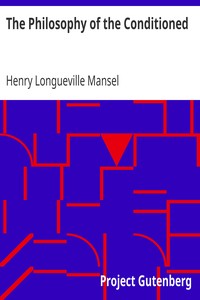The Philosophy of the Conditioned by Henry Longueville Mansel
Read now or download (free!)
| Choose how to read this book | Url | Size | ||||
|---|---|---|---|---|---|---|
| Read online (web) | https://www.gutenberg.org/ebooks/28484.html.images | 221 kB | ||||
| EPUB3 (E-readers incl. Send-to-Kindle) | https://www.gutenberg.org/ebooks/28484.epub3.images | 160 kB | ||||
| EPUB (older E-readers) | https://www.gutenberg.org/ebooks/28484.epub.images | 163 kB | ||||
| EPUB (no images, older E-readers) | https://www.gutenberg.org/ebooks/28484.epub.noimages | 138 kB | ||||
| Kindle | https://www.gutenberg.org/ebooks/28484.kf8.images | 315 kB | ||||
| older Kindles | https://www.gutenberg.org/ebooks/28484.kindle.images | 307 kB | ||||
| Plain Text UTF-8 | https://www.gutenberg.org/ebooks/28484.txt.utf-8 | 197 kB | ||||
| Download HTML (zip) | https://www.gutenberg.org/cache/epub/28484/pg28484-h.zip | 156 kB | ||||
| There may be more files related to this item. | ||||||
Similar Books
About this eBook
| Author | Mansel, Henry Longueville, 1820-1871 |
|---|---|
| Title | The Philosophy of the Conditioned |
| Credits |
Produced by David Clarke, Tim Krajcar and the Online Distributed Proofreading Team at https://www.pgdp.net (This file was produced from images generously made available by The Internet Archive/Million Book Project) |
| Summary | "The Philosophy of the Conditioned" by Henry Longueville Mansel is a philosophical treatise written in the mid-19th century. The work focuses on examining the philosophical currents of the time, particularly critiquing the ideas of Sir William Hamilton and John Stuart Mill regarding the concepts of the conditioned and unconditioned. Mansel delves into the nature of consciousness, knowledge, and the limits of human understanding, engaging deeply with metaphysical concepts that relate to our perception of reality. The opening portion of the text introduces Mansel's motivation for writing, which stems from his reflections on a previous anonymous review of Hamilton’s philosophy that he felt required defense. He outlines the philosophical debate on conditioned and unconditioned existence, invoking Plato to discuss the aspirational journey of reason toward the unconditioned as a means of better understanding the nature of truth. Both the complexities of consciousness and the challenge of reconciling knowledge with the divine are addressed, setting the stage for a nuanced discussion on how humans engage with abstract principles and the implications for belief in a personal deity. The philosophical tensions established in the introduction suggest a foundational exploration of faith, reason, and their intersections with human cognition. (This is an automatically generated summary.) |
| Language | English |
| LoC Class | B: Philosophy, Psychology, Religion |
| Subject | Hamilton, William, Sir, 1788-1856 |
| Subject | Mill, John Stuart, 1806-1873. Examination of Sir William Hamilton's philosophy |
| Category | Text |
| EBook-No. | 28484 |
| Release Date | Apr 3, 2009 |
| Most Recently Updated | Jan 4, 2021 |
| Copyright Status | Public domain in the USA. |
| Downloads | 57 downloads in the last 30 days. |
| Project Gutenberg eBooks are always free! | |

